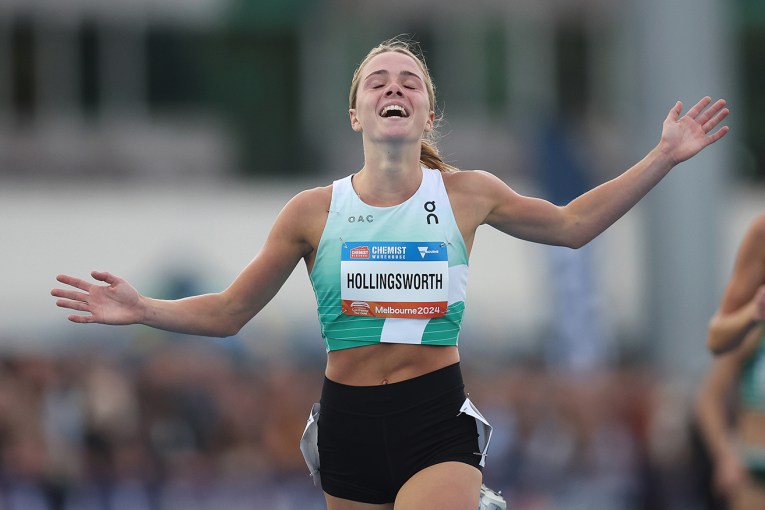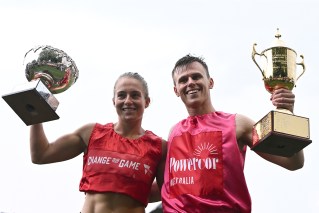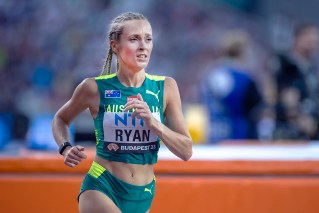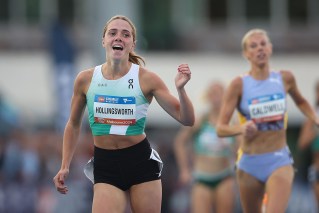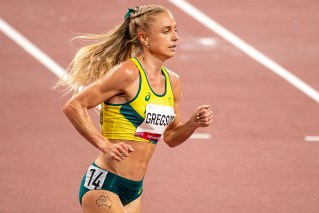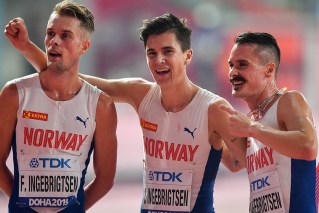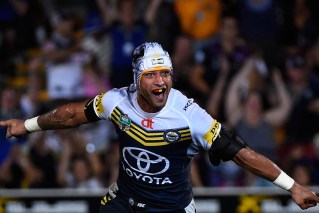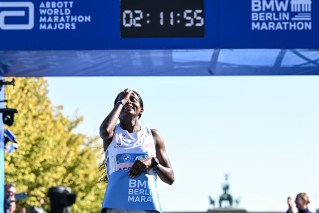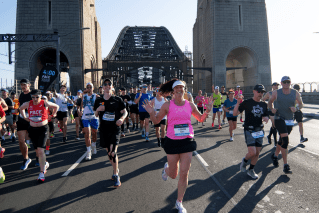The injection of self-belief that changed Australia forever
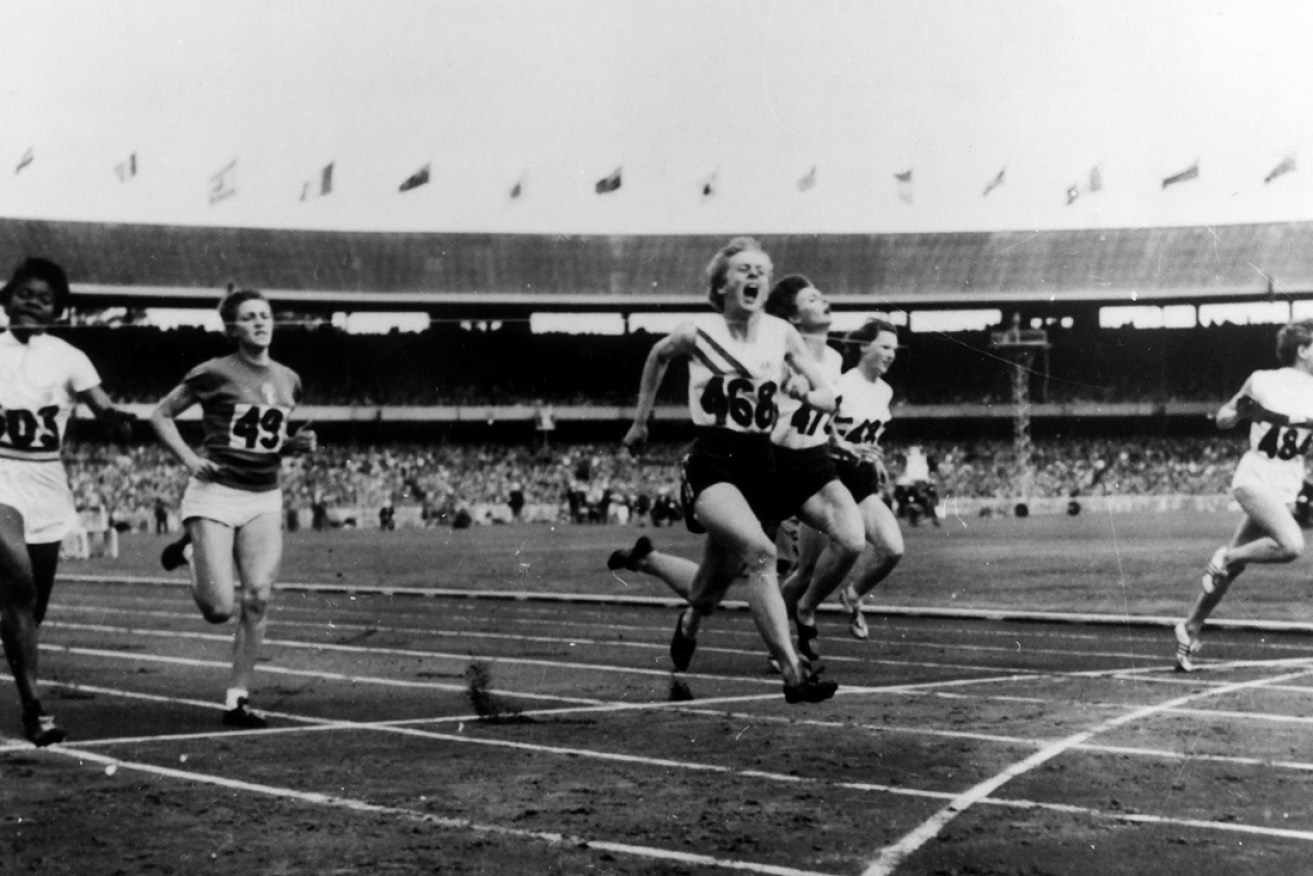
Betty Cuthbert crosses the line first in the 1956 Olympic Games 100m sprint. Photo: Getty
It happened 60 years ago this month and I was there to see it.
It was the event that changed Australia forever.
I was aged 13 and was with my parents at the Melbourne Cricket Ground for the first Monday of the 1956 Olympic Games.
We were high up in the ground and vaguely aware of some women athletes lining up and then the gun firing.
The women took off and we were mildly taken by the one who went to the front.
Wasn’t that Australian gear she was wearing?
It was 18-year-old Betty Cuthbert, mouth open, charging just ahead of Christa Stubnick of East Germany and then, good grief, breaking the tape.
Then the crowd realised and the cheering began. It all seemed so uncertain to me.
It was as if the crowd thought, hang on, that’s an Australian girl who is not only allowed to compete – she’s in front and she’s won! She’s won the 100-metre sprint.
Amid all the excitement of the past weeks … foreigners and their tightly-muscled bodies infesting the newspapers … an Australian had beaten them all.
Australia was never the same again.
That day finished, but it wasn’t all.
Jon Hendricks, Murray Rose, Dawn Fraser and Lorraine Crapp continued the slaughter in the days following.

Marlene Matthews, who won bronze, Cuthbert and Stubnick pose after the race. Photo: Getty
Of course we’d won gold before, here and there. And tennis, cricket, golf.
But this was at our place, this was at home, this was the MCG, this was the Olympic Games and we were showing them how.
We went on to win several more, mainly athletics and swimming, and ended up with a cluster of gold medals behind only to the mighty United States and the feared Soviet Union. Little Australia was third!
Betty went on to win two more gold medals at the same Olympics, then more in later years. But by then, we sort of expected it.
Nobody did at Melbourne, 1956.
This happened also at a time when Australia was emerging, slowly, into the world. It was after World War II. Australia was tentative, nervous, junior.
We were privileged in the past to help Britain and the United States, our senior partners, in two world wars. They were our bosses.
Sir Robert Menzies said it in 1939, at the start of the war. Because Britain was at war, so were we, he said.
Post-Cuthbert, the world was ours.
We built the Sydney Opera House. We won the Booker Prize several times; Tom Keneally, followed by two from Peter Carey and one later from Richard Flanagan.
Australians began to travel en-masse rather than stay home to “earn a living”.
In 1962, Russian migrant Tania Verstak became Miss International and thus a million other migrants came to Australia at a time when the national encouragement was “populate or perish”.
Australian film directors were in demand in Hollywood and London.

Raelene Boyle and Cuthbert at the Sydney Games in 2000. Photo: Getty
So were our actors and actresses.
Cate Blanchett’s successes seem all too predictable now, but she wouldn’t have done it 50 years earlier.
No longer did we watch Elvis from afar. We went and did it with ACDC, INXS and countless others.
Is it too much to attribute all this to one person?
Is Betty Cuthbert with her mouth open storming up the track, too shy to realise it? Well, probably.
But this is the perspective of a 13-year-old boy who was looking for someone to thank for changing the way we think about ourselves.
He noticed it first from the grandstand at the MCG in 1956.
As far as he was concerned at age 13, we could now take on anyone. It was the greatest injection of self-belief imaginable.
What a sight it was at the Sydney Olympics, 44 years later.
Dawn Fraser, Raelene Boyle, Cathy Freeman, all gathered around Betty Cuthbert in her wheelchair.
Yes, she has multiple sclerosis now and lives quietly in Perth. What a reminder of that debt from 1956.
“I bet I know the headline in tomorrow’s paper,” said my father in the fawn Austin A40 driving home. “Australia’s Day.”
Dad, thanks for taking us.
